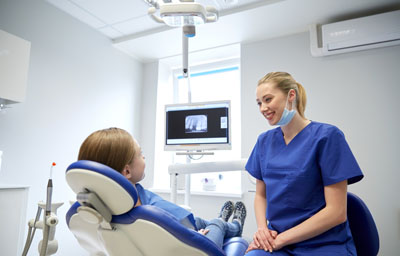


 Oral health partially hinges one's willingness to clean his teeth on a regular basis. However, one's nutrition and use of tobacco and/or alcohol also play a role in oral health. Oral health experts are on-hand to provide nutritional counseling for those who seek healthier teeth and gums.
Oral health partially hinges one's willingness to clean his teeth on a regular basis. However, one's nutrition and use of tobacco and/or alcohol also play a role in oral health. Oral health experts are on-hand to provide nutritional counseling for those who seek healthier teeth and gums.
Dentists are Health Care Educators
Most people think of dentists as professionals who clean teeth, fill cavities and perform dental procedures like root canals. Yet dentists also play an important role as educators. Dentists have an expansive knowledge base on how oral hygiene can benefit the body.
It is beneficial to tap into the expertise of a dentist to learn about which foods and beverages are optimal for oral health. Proper diet and nutrition really can prevent oral health conditions. Optimal eating and drinking habits can also ameliorate efforts to treat oral health problems.
Nutritional Counseling Starts With an Assessment
It is important to begin by performing an initial assessment that gauges the dietary factors contributing to the patient's disease or putting the patient at risk for diseases. By analyzing the individual's dietary behaviors and diet, we can begin to pinpoint strategies for altering food intake and enhancing nutritional health.
Patient counseling then commences. The patient must be willing to gradually improve his dietary knowledge so he can make prudent decisions regarding food and beverage consumption across posterity. Though making changes to consumption habits is difficult, a gradual improvement in diet will significantly improve oral health.
Why Diet Matters in the Context of Oral Health
The nutrients in foods are important for the growth of tissue as well as maintaining healthy tissue and repairing injured tissue. Nutritional counseling recognizes the fact that a patient's diet contributes to disease. By engaging in nutritional counseling, the oral health care provider will assess and manage risks related to nutrition.
The combination of beverages and food one consumes has the potential to impact the risk for caries, responses to infection and injury and the health of the soft tissue. Dental caries can be particularly concerning. This is a disease in which the acid generated by oral microorganisms disintegrates enamel and/or dentin. Oral pathogens are incapable of fermenting fats, proteins and non-nutritive sweeteners like sucralose and aspartame. This is why carbohydrates can be considered to be cariogenic. Non-nutritive sweeteners, fats and proteins are considered to be non-cariogenic.
Meet with your dentist for nutritional counseling and you will learn about how consumption behaviors alter the risk for caries and other oral health problems. You will learn how to change your behaviors to reduce exposure to cariogenic beverages and foods. As an example, structured times for meals and snacks in which there is less than five eating events in a day decreases risk. Unstructured eating like grazing heightens the risk for caries. This is just one example of how nutritional counseling can improve your oral health.
Related Posts
Practicing preventive dentistry at home allows you to reap many benefits for your general health. Brushing and flossing every day is a basic way of keeping your mouth in good shape. Having healthy teeth and gums helps support your whole body’s health. If you want to find out why good everyday dental hygiene is important…
In recent times, more and more people are catching up with the importance of tooth enamel and its contribution to ensuring excellent oral hygiene.The tooth enamel is the first and strongest layer of the teeth. It serves as a sturdy shield for the teeth and protects the delicate layers of the teeth and gum against…
Sensitive teeth can be a horrible feeling, leaving you conscious of the pain in your teeth for the majority of each day, especially while eating or drinking.The good news is that there are easy ways to deal with sensitive teeth, without having to make major changes to your daily lifestyle.To keep sensitive teeth at a…
Oral hygiene is probably the last thing on your mind when you are planning your vacation. You are likely thinking about warm temperatures, clear skies, refreshing water, sand and fun. However, if you spend too much time enjoying yourself, you will either forget to clean your teeth or simply neglect them as you are exhausted.…


